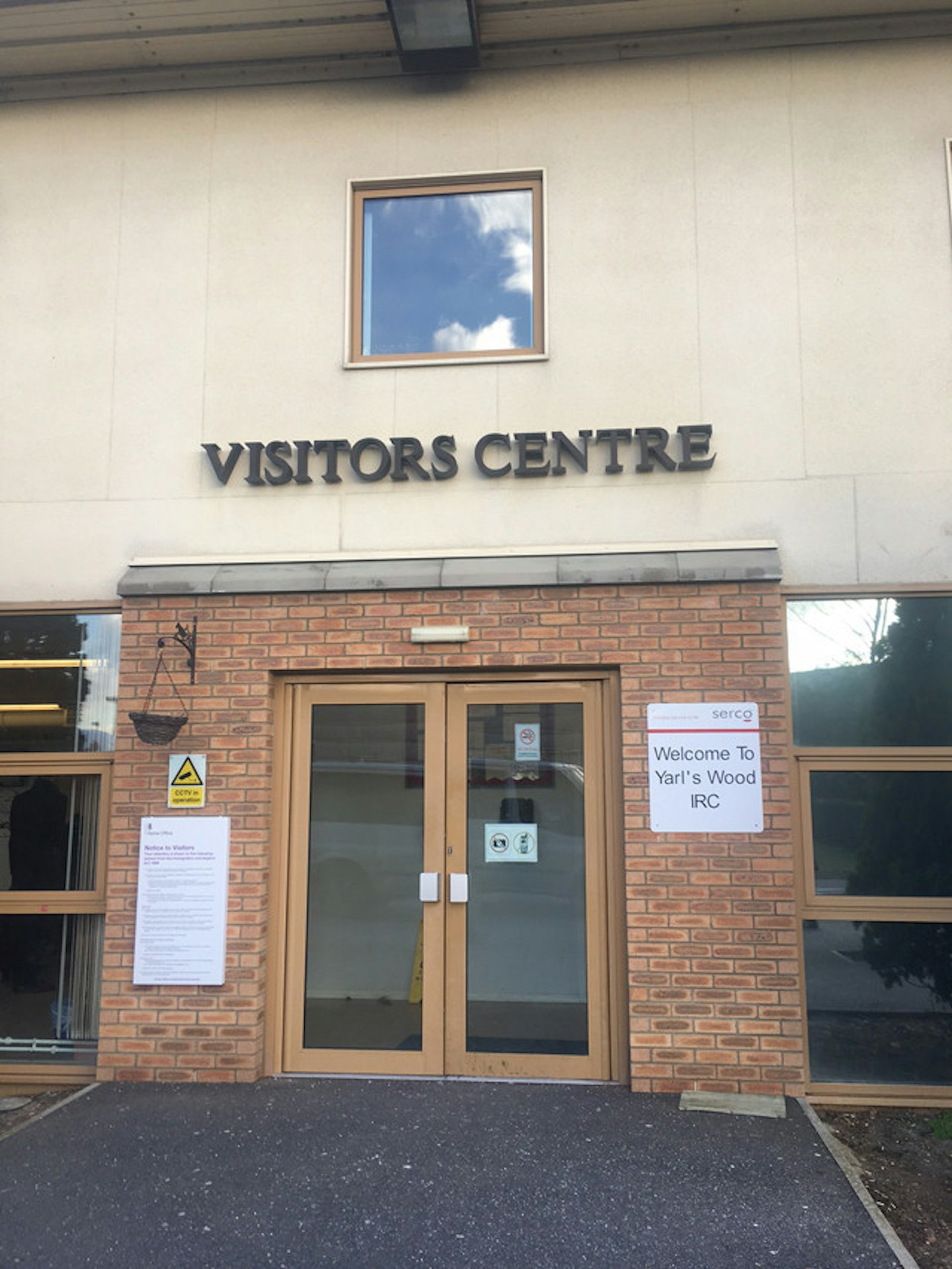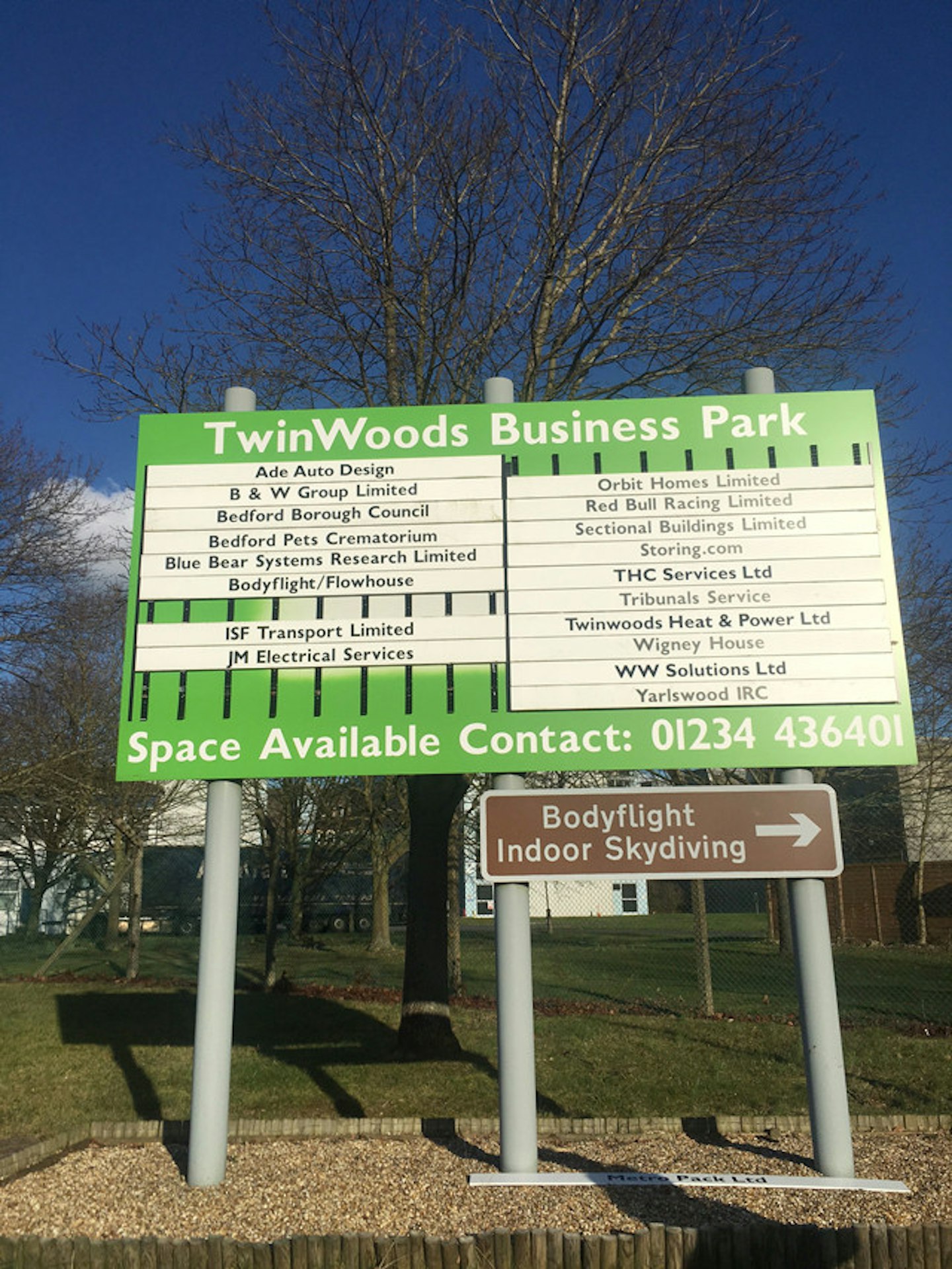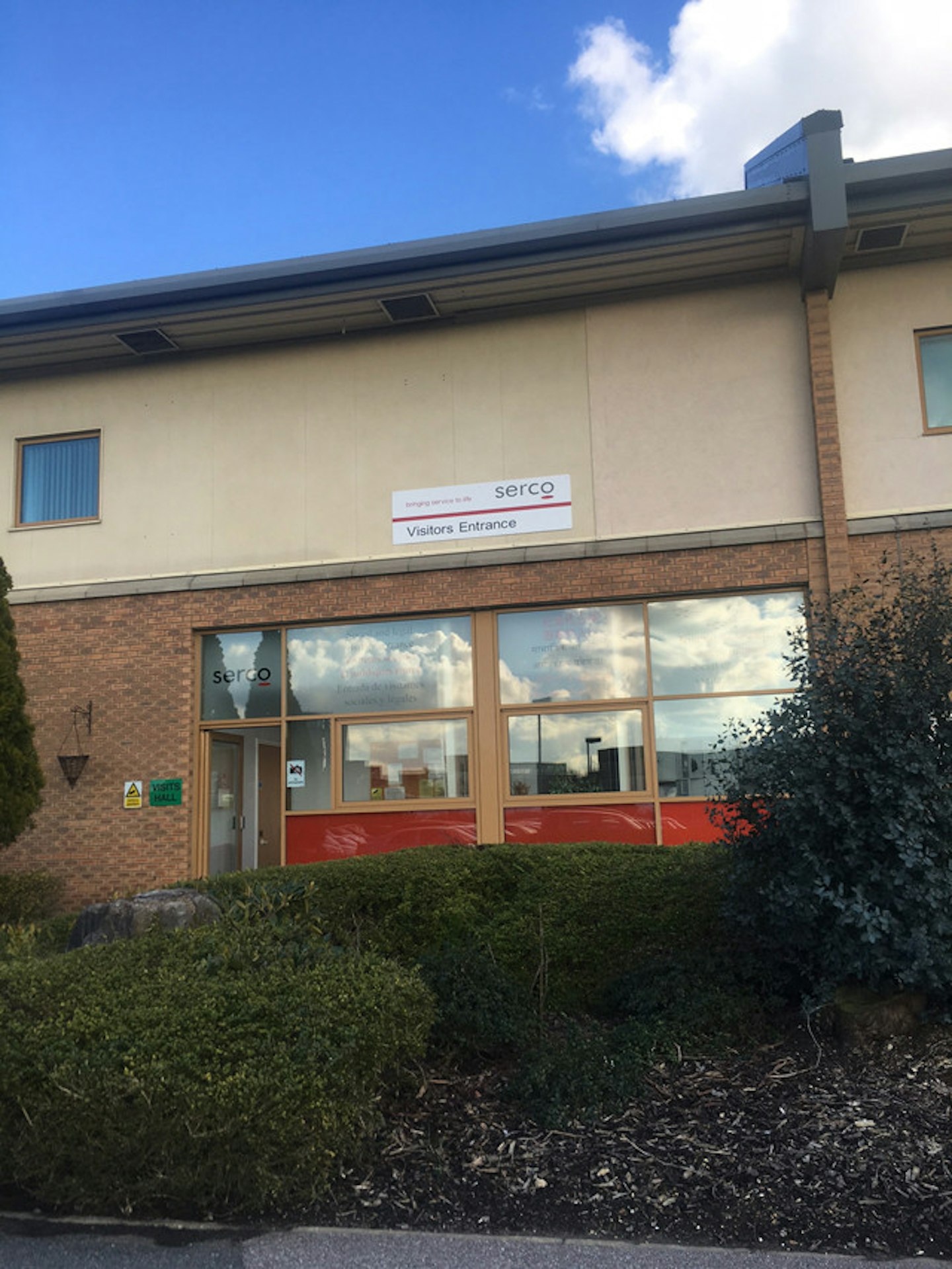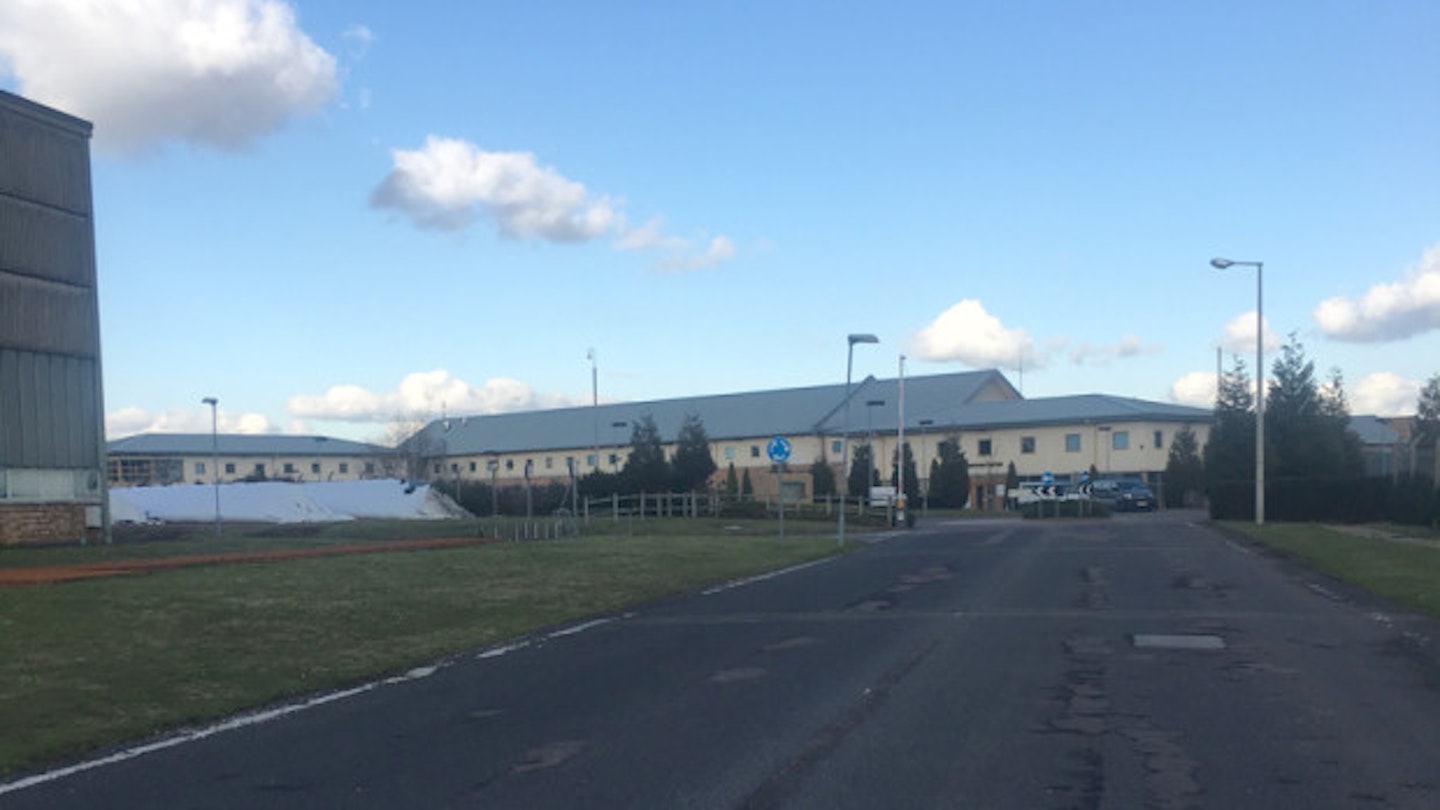The train journey to Bedfordshire is nice enough, picturesque even. It’s always good to get out of London, as high rise tower blocks give way to rolling green hills you can’t help but feel a sense of relief. Bedford station itself is pleasant too, one of those commuter belt places which is spacious, green and just quiet enough but not too quiet. Given that I’m on my way to Yarl’s Wood to meet female refugees who are being detained, indefinitely, it’s a surreal feeling. Looking out of the window, it’s easy to forget where we are headed.
I’m with Sarah from Women for Refugee Women, a charity which campaigns for women who seek asylum in this country. She has bags of toiletries with her: shower gels, shampoo, deodorant. ‘Mostly donations’ she says, ‘we got loads at Christmas. The women are only allowed 25 kg of stuff with them at any time…I guess it’s because that’s the flight limit, that’s how much stuff you can take if you get deported.’
In a culture that tells you ‘you are what you have’ the message being sent to women being detained in Yarl’s Wood IRC (that stands for Immigration Removal Centre) is that they are the sum of their parts: no more than the flight limit for a passenger waiting to get on a plane.

Yarl’s Wood can hold up to 410 people, it mostly houses women, some of them pregnant
The place itself is one giant waiting area, it’s like a cross between a giant out-of-town Travelodge and an airport lounge – everybody is waiting for something to happen, to them or to someone else, their agency has been taken away from them. Their lives are stuck in a holding pattern until somebody, somewhere makes a decision about whether they can stay or whether they must go.
From the outside, the centre could be a conference centre but razor wire, security cameras and staff in uniform quickly confirm that this is a custodial environment.
Yarl’s Wood is one of 11 immigration detention centres in Britain, run by a private sector company. It holds up to 410 people, mostly women, some pregnant, who are awaiting and, often, fighting deportation. It’s controversial and has faced heavy criticism in recent years.
Many of these women have done nothing wrong. Around half of the women in Yarl's Wood have claimed asylum and many are still waiting for decisions and appeals to be heard. But, even if they aren't criminals they are detained as through they are, in a place which feels like a prison. To get into the visiting room from the outside even I, as a visitor, have my fingerprints taken, am patted down and have to go through one airtight locked door into an antechamber before a member of staff on the other side lets me through a second locked door to get inside.
In the detention centre’s visiting room, emotions run high. A woman waits to my left, angrily, for a visitor who never seems to come. Next to her a woman is having a heated discussion about her legal situation while her suited visitor leafs through documents. To my right, another is laughing with her male visitor as they look through a newspaper, suddenly she holds her head in her hands and starts sobbing, he touches her on the arm. Another woman totters back and forth across the room, smiling, in an elaborately embroidered sari and heels, while her visitor sits down, looking on adoringly, a bunch of cellophane wrapped flowers with a purple ribbon propped up next to him.
There is no limit on the time that an asylum seeker can be held for in Britain

Yarl’s Wood is supposed to be a removal centre, housing detainees due to be deported, but it turns out that three-quarters are eventually released according to a report conducted last year by the outgoing Chief Inspector of Prisons, Nick Hardwick. Britain is the only EU member state with no limit on the time that asylum seekers can be detained – they can, in effect, be held indefinitely and legally without decision.
I speak to Amara and Abebi, they’re twins. ‘We are both 19, we’ll be 20 on Monday.’ They’re ‘not sure’ when they will hear about their asylum claim, ‘with interviews and stuff they might tell you the day before, it’s usually on the day though…you don’t get much warning.’
Amara has been at Yarl’s Wood just over three months. They grew up in the UK, went to school here and went through the care system here in their teens. ‘They are trying to send us back to the Congo, but we left there when we were 4’ Amara says, ‘we don’t even know where we are from there, we’ve got no family there that we know of, the reason we left in the first place is because we were accused of being witches because we are twins, we were abused because of that, there is a cultural belief there about witches and twins.’
Abebi has been detained at Yarl’s Wood one month longer than her sister. ‘She had no warning that she was being brought here’ Amara says, ‘she thought she was having an asylum interview about her case and they brought her here, she had no stuff with her, they said they sent her a letter but she never got it, they sent it to an old address.’
Stories like this are not uncommon, of women being detained at short notice. As Sarah from Women for Refugee Women points out, such treatment only discourages asylum seekers from attending their scheduled meetings, perpetuating a culture of fear.
Handcuffs for medical visits
Elisha* has been being held at Yarl’s Wood for over a year, ‘it was one year last November’ she tells me. She is HIV positive and tells me that every time she has to go to the local hospital to get her medication or have a check up she is taken there in handcuffs.
‘They handcuff me every time I go for treatment. They told me it’s because of ‘risk assessment’ but it’s not like I don’t want to go. Why do they handcuff me? They say it’s immigration security who tell them I have to be handcuffed.’
‘When I refuse the handcuffs they say my behaviour is bad – they use everything against me’, she sighs.
She’s 30 years old. ‘I’ve had a very bad experience here’ she tells me, ‘it makes me really upset.’ Her own situation is complex, she fled her native Guinea because her family were trying to arrange for her to marry her cousin. She tells me that she married an English man, a charity worker who she met and saw as a way out of her situation, she married him and her family then disowned her because he was not a Muslim. She was a teenager at the time, once in this country the relationship became abusive she says, she fled and now has no contact with him.
‘The women who come here, they have been abused. Abused by their partners, but here we are restrained. It’s not right.’
‘Sometimes they come to check when you are showering’
Elisha confirms that there is also a general lack of privacy in general at the centre, ‘sometimes they come to check when you are showering, and most people share a room.’
Amara and Abebi tell me about relations between officers and detainees. There have been allegations against Serco of sex abuse. Last year somewomen being held at the centre claimed that guards offered to assist in their cases in return for sexual contact.
‘It’s just depressing’ Amara says, ‘the officers here…before we put in a complaint about an officer - we felt we were being targeted because my sister got into an argument with another girl who was going out with one of the officers, eventually he got suspended, other people reported him too.’
‘Now we just stay in our room. There aren’t a lot of young people here and officers will find any excuse to get me and my sister in trouble, we got separated yesterday for no reason, so we’ve just decided not to socialise with anyone, to just stay in our room.’
‘We’ve got friends outside, we usually just talk to them on the phone because it’s quite far for them to come and visit, they’re all in London, they’re friends from when we were at school...’
What does a place like Yarl’s Wood say about our attitude to refugees?

Why are we imprisoning people who have done nothing wrong? Many of the women currently being held at the centre are the victims of sexual violence and torture, they are suffering with mental-health issues and trauma as a result. This is only exacerbated by the fact that they are effectively being imprisoned, taken to medical appointments in handcuffs and left uncertain about their own futures.
Last year Channel 4 screened an undercover investigation, filmed inside Yarl’s Wood which showed officers calling women names and treating them inappropriately. Shortly after this the All Party Parliamentary Group on Migration released their own report, revealing the mental trauma of indefinite detention.
Elisha says the women being detained in the centre are constantly fearful, ‘3 weeks ago they took someone by force on what they said was a hospital visit, but they were actually deporting her, they told her she was going for medication – but she never came back – her roommate was like ‘where is she’, she didn’t even know it was happening.’
Amara told me she wants to found a charity to use what she’s been through to help young people, ‘I got involved with gangs and stuff when I lived with my stepmum. I was abused, I didn’t know the law, I didn’t know. I want to teach young people about self love – show them that it doesn’t have to be like that. People are being abused behind closed doors, they’re too scared to run away.’
Elisha wants to become a lawyer, so she can help people like her to understand the legal system and their own cases.
It’s on the taxi journey back to Bedford station from Yarl’s Wood that the absurd nature of the place really hits me. In the middle of an out-of-town business park, which is also home to a pet crematorium, and indoor sky diving centre and the HQ of Red Bull racing, Yarl’s Wood is surrounded by rolling green hills. It’s a pleasant setting, but time does seem to stand still outside the centre just as it does for the women being held inside.
The taxi driver who picks us up for the 20-minute drive back to Bedford station knows where we’ve been, ‘I don’t know what I think about it’ he says, ‘I mean I suppose we need places like that today.’
Do we? It doesn’t have to be like this; there are proven ways of doing things differently. Other countries don’t feel the need to detain and imprison asylum seekers, so why do we? Belgium, for example, runs ‘return houses’ for asylum seeker families, as well as those awaiting return to other nations. Staff are on hand to advise and prepare families for different outcomes – being granted asylum, or returned. In Canada asylum seekers are not detained – fewer than 4% abscond and this system has been found to be no less than 93% cheaper than the cost of detention.
So what are we so afraid of here? What is it that these women threaten so greatly that we must lock them away? Reportafter reporthas shown that Yarl’s Wood is failing the women it holds, not meeting the needsof vulnerable women and not in step with the actions other countries take when it comes to asylum seekers and, yet, nothing changes.
*Names have been changed
-
Women For Refugee Women asked 99 women to write a message in support of refugee women, to reflect the 99 women who were pregnant and detained in 2014. You can find out more here. *
Like this? Then you might also be interested in:
I Teach Young, Male Refugees In Germany - And The Headlines Don't Tell The Whole Story
Follow Vicky on Twitter: @Victoria_Spratt
This article originally appeared on The Debrief.
